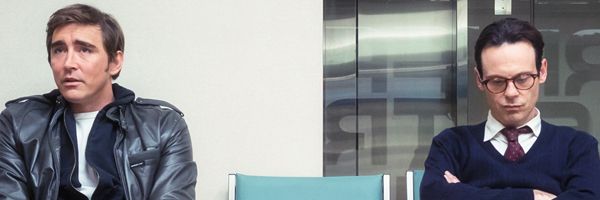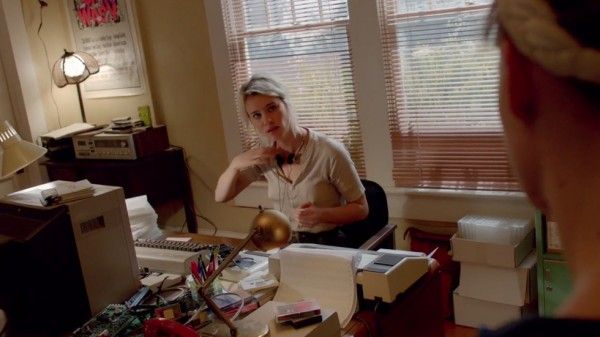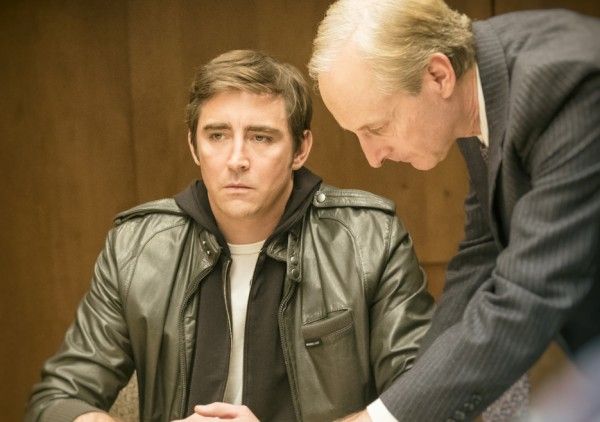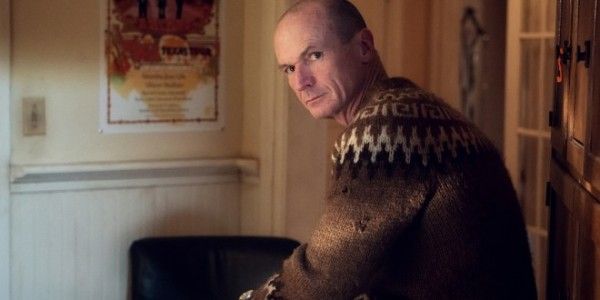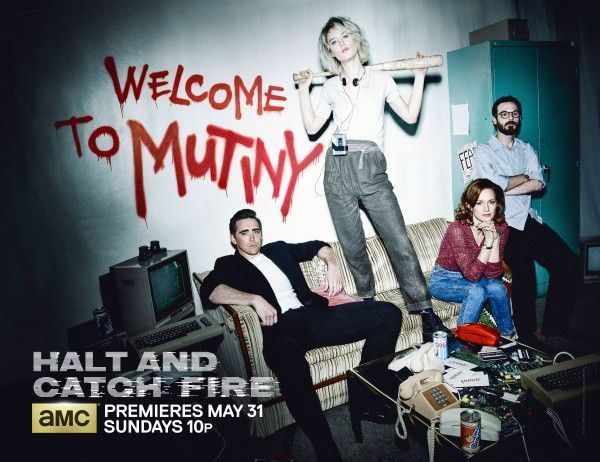Toward the beginning of Halt and Catch Fire’s second season, Cameron Howe (Mackenzie Davis) finds herself doing something she probably never wanted to do: answering a customer service inquiry. The customer, a user of one of the games produced by Mutiny, Howe’s rebellious think-tank-slash-company, is a bit confused by the use of mirrors in one of the games, and Howe quickly corrects him to say that the mirrors are actually holograms. It’s a small moment that echoes the show’s complicated vision of men and women building computers often at the expense of looking at themselves or tending to interpersonal relationships, and as Mutiny begins to feel some second-year turbulence as a business in Season 2, the repression of these elements nearly wrecks Howe and her team.
These, of course, are the same issues that Joe MacMillan (Lee Pace) and Gordon Clark (Scoot McNairy), Howe’s former colleagues at Cardiff Electric, are dealing with in very different ways. Clark’s building of the Cardiff Giant, and its follow-up, has made him a popular man amongst his friends and co-workers, and a rich man, considering that, as the first episode opens, Cardiff is being sold off and Clark is receiving a check for a little under one-million dollars. The money is great and all, but professions are inextricable from persona in Halt and Catch Fire, as Joe, Clark and Howe all see themselves on the brink of vast, globally important discoveries. The show, however, depicts discovery as an addiction, as debilitating as the cocaine use that Clark picked up while finishing up his last projects at Cardiff.
Similarly, the show has grown just a bit too enamored and caught up in its technical lingo, to the point where the lines that attest to the expertise of these characters surpasses convincing, and begins to grow just plain dull. Most of the talk comes from Clark and in the first season, he was balanced out by the gargantuan, showboating personality of Joe, who had style in spades where Clark had intellect to spare. When we meet Joe in the second season, he’s repressed his ambitions and oversized character, sublimated them while romancing Sara (Aleksa Palladino), the daughter of a major oil magnate, Wheeler (James Cromwell). As the episodes go on, the show increasingly insinuates that this more becalmed and polite version of Joe is a thin cover that’s about to be torn open, especially when Joe takes a job with Wheeler, but a lot of the dialogue still feels like having top-tier character actors reading assembly guides for second-generation laptops for you.
That being said, the show remains deeply fascinating in its depiction of this early wave of computer-based start-up businesses, and the first versions of online stalwarts like chatrooms and peer-to-peer gaming. The series is at its best when finding the nuances in how Mutiny, now run by Howe and Donna (Kerry Bishé), Clark’s wife, decides to use its modest profits and powerful skillset to grow as a company. As Howe and Donna are both newly liberated engineers and coders, out from under the command of family and men, neither of them want to have to take care of the business and play mother hen to the houseful of coder geeks that makes up Mutiny. It’s their struggle to realize that their inventiveness is worthless without a sense of management and strategy that powers much of the involving, occasionally captivating, drama at the start of Season 2, but it inadvertently shines a light at the overtly slow pace at which the writers and creators are building Joe and Clark’s storylines.
Like it’s comedic doppelganger, Silicon Valley, Halt and Catch Fire is about the balance between technology and humanity, the symbiotic relationship between both, and for all the overblown technical knowledge and jargon being slung around throughout the series, it’s the human moments that are its most rewarding. Howe’s discovery of a mild-mannered coder genius, Tom (Mark O’Brien), sparks a new, totally accepting romance for her, a interesting contrast to Joe’s relationship with Sara, which depends, to a degree, on repression. Davis and O’Brien both evoke the underlying sweetness of both of their characters without diluting their competitive, evenly matched ingenuity and studied perspectives.
Still, even they are not quite as endearing as John Bosworth, the former Cardiff manager who went to jail to avoid the dissolution of the Cardiff Giant, played with effortless grace, warmth, and honed comedic timing by the great Toby Huss. Upon his release from jail, Bosworth is immediately employed at Mutiny, but his reintegration into society takes more than a living wage and a few friends. The very best scenes in the first quarter of the second season come from Bosworth’s attempts to reconnect to his old life, either by catching some afternoon delight with his ex-wife or skulking outside his son’s rehearsal dinner. In these sequences, Huss summons a feeling of genuine melancholy that the rest of the show never quite nails, a real sense that when you lose certain parts of yourself, there’s no getting them back, for better and worse. The only choice for Bosworth is to move forward with Mutiny, putting what’s left of his personal life into an online programming and gaming company, and hoping that he’s able to find a new personal life with Howe and Donna. Similarly, Halt and Catch Fire is betting on wrenching out the humanity in a gaggle of computing visionaries, attempting to balance long bouts of rampant tech talk with sublime sequences of unexpected intimacy that are rare in the modern television landscape.
★★★ Good — Proceed with cautious optimism

